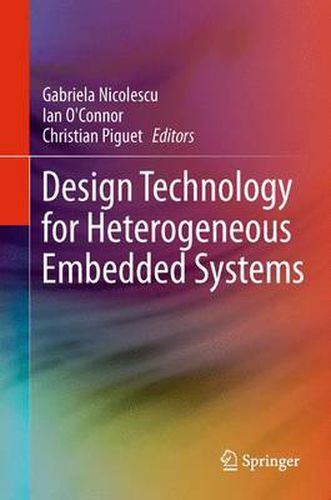Readings Newsletter
Become a Readings Member to make your shopping experience even easier.
Sign in or sign up for free!
You’re not far away from qualifying for FREE standard shipping within Australia
You’ve qualified for FREE standard shipping within Australia
The cart is loading…






This title is printed to order. This book may have been self-published. If so, we cannot guarantee the quality of the content. In the main most books will have gone through the editing process however some may not. We therefore suggest that you be aware of this before ordering this book. If in doubt check either the author or publisher’s details as we are unable to accept any returns unless they are faulty. Please contact us if you have any questions.
Design technology to address the new and vast problem of heterogeneous embedded systems design while remaining compatible with standard More Moore flows, i.e. capable of simultaneously handling both silicon complexity and system complexity, represents one of the most important challenges facing the semiconductor industry today and will be for several years to come. While the micro-electronics industry, over the years and with its spectacular and unique evolution, has built its own specific design methods to focus mainly on the management of complexity through the establishment of abstraction levels, the emergence of device heterogeneity requires new approaches enabling the satisfactory design of physically heterogeneous embedded systems for the widespread deployment of such systems.
Heterogeneous Embedded Systems, compiled largely from a set of contributions from participants of past editions of the Winter School on Heterogeneous Embedded Systems Design Technology (FETCH), proposes a necessarily broad and holistic overview of design techniques used to tackle the various facets of heterogeneity in terms of technology and opportunities at the physical level, signal representations and different abstraction levels, architectures and components based on hardware and software, in all the main phases of design (modeling, validation with multiple models of computation, synthesis and optimization). It concentrates on the specific issues at the interfaces, and is divided into two main parts. The first part examines mainly theoretical issues and focuses on the modeling, validation and design techniques themselves. The second part illustrates the use of these methods in various design contexts at the forefront of new technology and architectural developments.
$9.00 standard shipping within Australia
FREE standard shipping within Australia for orders over $100.00
Express & International shipping calculated at checkout
This title is printed to order. This book may have been self-published. If so, we cannot guarantee the quality of the content. In the main most books will have gone through the editing process however some may not. We therefore suggest that you be aware of this before ordering this book. If in doubt check either the author or publisher’s details as we are unable to accept any returns unless they are faulty. Please contact us if you have any questions.
Design technology to address the new and vast problem of heterogeneous embedded systems design while remaining compatible with standard More Moore flows, i.e. capable of simultaneously handling both silicon complexity and system complexity, represents one of the most important challenges facing the semiconductor industry today and will be for several years to come. While the micro-electronics industry, over the years and with its spectacular and unique evolution, has built its own specific design methods to focus mainly on the management of complexity through the establishment of abstraction levels, the emergence of device heterogeneity requires new approaches enabling the satisfactory design of physically heterogeneous embedded systems for the widespread deployment of such systems.
Heterogeneous Embedded Systems, compiled largely from a set of contributions from participants of past editions of the Winter School on Heterogeneous Embedded Systems Design Technology (FETCH), proposes a necessarily broad and holistic overview of design techniques used to tackle the various facets of heterogeneity in terms of technology and opportunities at the physical level, signal representations and different abstraction levels, architectures and components based on hardware and software, in all the main phases of design (modeling, validation with multiple models of computation, synthesis and optimization). It concentrates on the specific issues at the interfaces, and is divided into two main parts. The first part examines mainly theoretical issues and focuses on the modeling, validation and design techniques themselves. The second part illustrates the use of these methods in various design contexts at the forefront of new technology and architectural developments.